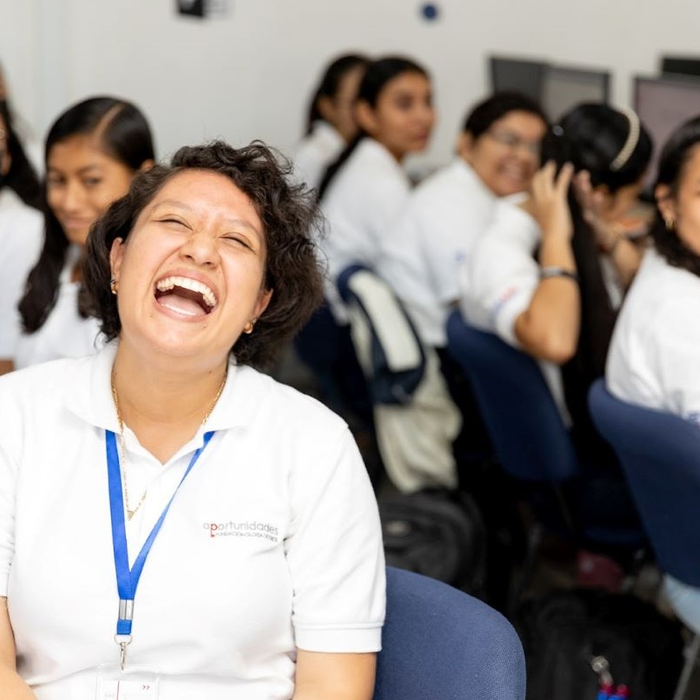How Morocco’s Career Center is Preparing Young People for an Ever-Changing Job Market
 Photo Credit: Carole Douglis
Photo Credit: Carole Douglis
As in many countries, youth unemployment rates are high in Morocco. Yet there’s an unexpected twist in Morocco: it’s often the more educated people that are most likely to be un- or under-employed. In fact, the unemployment rate among those with degrees is 17.1%.
Unfortunately for many Moroccans with higher education degrees, the job market has shifted in recent years. Public-sector opportunities continue to decline and while there are job opportunities in the private sector, either youth are not attracted to private-sector jobs or businesses complain that graduates lack industry-specific skills and soft skills. Even post-secondary science, technology, engineering, math (STEM) and technical-school students lack these essential skills to transition to employment.
Bucking the Trend through Resources and Training
Responding to these trends, USAID/Morocco designed the USAID Career Center (CC) program to help young Moroccans prepare for and connect with the job market.
See how Career Centers are promoting the employability of young people.
Launched in 2015 in collaboration with the Ministry of National Education, Vocational Training, Higher Education and Scientific Research, the program has built and equipped six physical Career Centers at universities and vocational schools in Marrakech, Tangiers and Casablanca. In addition, the Virtual Career Center offers online services to all.
Students didn’t exactly come flooding in at the beginning, says Yassine Ouallou, an electrical engineering student and Career Center Youth Ambassador in Casablanca. Ouallou and other ambassadors reach out to peers in university classes and other activities, explaining why they should visit the Center.
Many are hesitant, but when students step inside, the bright space and welcoming demeanor of career counselors usually win them over. Visitors sign up for aptitude tests and career counseling; workshops on how to network, write resumes and prepare for interviews; classes in soft skills including teamwork and time management; opportunities to meet employers; and other events. Services respond to real needs, and the “customers” are catching on: when Ouallou announced an interview workshop on the engineering school’s Facebook page, over 100 students rushed to sign up for 30 spots.
Encouraging Self-Reflection as well as Skill-Building
One way the Centers draw students out is a workshop called “Know Yourself.”
“We ask students, Who are you; what are your values? What do you want?” says Asmae Mani, Career Counselor in Casablanca. “These questions are new for many. We have students who cry — they’ve never been asked these things before, and they don’t know.”
Kenza Elbouazzaoui, studying materials science in Marrakech, says a reason students appreciate the Centers: “In our society, we don’t give children or even students the opportunity to express themselves,” she says. “It’s still very much — sit down and listen. So we can’t interview well, because you have to express yourself.”
Career Center goals encompass more than connecting youth with jobs. “With ‘Know Yourself’ and other activities, we’re trying to trigger a change in their mindset,” says Mani. “We’re trying to help them think more critically about themselves. Then they can think more critically about other things as well.” Mani credits the continuous training and coaching she receives through the project for enabling her to facilitate sensitive activities.
Counselors also guide participants to consider their gender assumptions. “We ask questions about the workplace and men and women,” says Mohamed Amine Belhouss, Career Center Advisor and Communication Counselor. “Not everyone is against women doing certain jobs. But for those who have gender bias, by the end of the questioning, they see there’s no reason to think women can’t do everything.”
Far-Reaching Results
More than 100,000 youth have benefited from the Career Centers, and more than 32,000 have registered online at the Virtual Career Center, which has logged over 620,000 visits.
The program has developed 24 soft-skills courses for in-person classes, plus 16 e-learning courses for the Virtual Career Center. According to USAID Career Center performance reporting, 59% of vocational institution online survey respondents and 26% of university respondents affirmed that the Career Center helped them get a job.
Two universities now use the courses in master’s programs. And Morocco’s largest provider of vocational training, with over 300 centers nationwide, has integrated soft-skills courses into their curricula for all students. In performance reporting, more than 90 % of youth respondents demonstrated improvement in skills after completing the Career Center activities
So far, more than 230 businesses have partnered with the Career Center, to benefit both students and enterprises.
Morocco has also been a model for other USAID Missions (like Egypt, El Salvador, and Mekong) to integrate similar programming aspects into their portfolio.
Toward Sustainability
The Government of Morocco has been deeply involved with the activity since the beginning. Partners are now working to solidify measures to sustain the career centers as USAID funding for the Career Centers activity ends in 2020. As part of the Government of Morocco’s strategy to enhance employability, the Ministry of Education has expressed commitment to continue the activity, as well as a willingness to allow the universities to manage the Centers going forward.
How have the USAID Career Center helped Moroccans find jobs?
Read the articleRelated Blog Posts

Embracing Effective Learner-Centered Approaches in Higher Education

One Year in Higher Education, Five Activities to Keep Learning From
